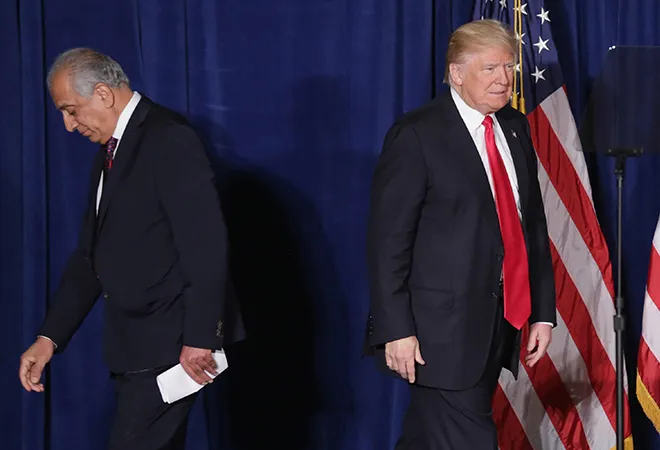
As the United States and the Taliban continue their negotiations, the future of Afghanistan and its people balances precariously on a cliff. Any day, any statement by a political leader could either bring the nation back over the edge, or plunge it down an abyss. It has been nearly a year since the United States appointed Zalmay Khalilzad as a special representative to negotiate with the insurgent group. After nine rounds of talks, plenty of posturing, political statements and petty politics later, we are told that the two sides are close to a deal. Whatever deal may emerge in the coming days, one thing is clear: it is not a peace deal, but a deal for withdrawal of American troops. Peace will have to wait a little while longer. At least, until the Afghan people are able to decide on their own, how they want to deal with the Taliban.
The US no longer finds itself, to use the overused cliché, in between a rock and a hard place; but instead it finds itself staring down the barrel of a gun it had once pointed towards the Taliban. They have not ended the Afghanistan war, they have lost the chance of victory. Irrespective of what the final agreement is, there will be regional actors and sub-actors who will be disappointed or will feel that the US has not lived up to its end of the bargain. Washington is aware of that, as well as the fact that it can no longer hope to please everyone, much less go back on the mistakes it has made. Nonetheless, the two sides have over the last few weeks, issued reports and statements that have brought into focus the reality, that there is no hope for a ‘good’ withdrawal agreement or a decent peace deal.
The US no longer finds itself, to use the overused cliché, in between a rock and a hard place; but instead it finds itself staring down the barrel of a gun it had once pointed towards the Taliban.
The first such example, is the statement of President Trump where he announced (or revealed) that the US would not withdraw all of its troops from Afghanistan, keeping troop levels at 8,600. The first question which comes to mind is: is this a good thing or a bad thing? The unfortunate answer is that it doesn’t matter. The US military cannot withdraw all its troops from Afghanistan because it is an extremely risky move that could result in a Taliban offensive to seize more territory and threaten Kabul. On the other hand, the US military cannot keep a large number of its troops in the country, because it would aggravate the Taliban further, prompting them to keep fighting until the US gives up completely. Even if what President Trump has stated has been agreed to by the Taliban negotiating team in Doha, what is to say that the rest of the Taliban rank and file will accept it, when they have always maintained that the only way they would lay down their arms is if the US left the country?
The second example illustrating how there are no good options left in Afghanistan, is the very notion of questioning whether the negotiating has been worth it. The argument in favour of negotiating is that without attempting to do so, there is no hope for the country. Even if the US prolongs its stay, there will be no improvement in Washington’s negotiating position; neither is it likely that they will be able to succeed in the future, when they haven’t been able to in 18 years. The other argument is that, there is nothing to indicate that the Taliban have changed or softened their ideology. Only last week, the spokesperson for the Taliban, claimed that al Qaeda was not responsible for the September 11 attacks. There are reports that Taliban commanders will continue to fight the Afghan government forces, in spite of any deal that may be signed with the US. So, is there really a point in making a deal?
Even if the US prolongs its stay, there will be no improvement in Washington’s negotiating position; neither is it likely that they will be able to succeed in the future, when they haven’t been able to in 18 years. The other argument is that, there is nothing to indicate that the Taliban have changed or softened their ideology.
There is no doubt that the United States has made many mistakes in Afghanistan. All three US presidents, Bush, Obama and Trump have taken steps that have been detrimental to the US war effort. However, the biggest mistake by far has been the failure of Washington to fix the problem that is Pakistan. No withdrawal agreement, no peace deal, no political meddling in presidential elections or billions of dollars in aid will fix the Taliban predicament as much as cracking the whip on Pakistan will. Even if the US leave, even if they stay and if the Taliban get a deal or if they don’t get a deal, Pakistan has been consistent in its treachery and disregard for Afghan citizens. It was in fact only a few weeks ago, that the Pakistan ambassador to the US attempted to blackmail the Americans to support Pakistan’s stance on India’s constitutional changes in Kashmir, in return for it supporting its objectives in Afghanistan. Nothing could be further proof of Pakistan’s duplicitous nature when it comes to harboring terrorists against Afghanistan and India. The Taliban’s close ties to the Haqqani Network, a terror network supported by Pakistan’s intelligence services, have only grown stronger over the years. Any deal which gives the Taliban a certain degree of power and authority, strengthens the Pakistani belief that they can use proxy groups to achieve their foreign policy objectives.
The biggest mistake by far has been the failure of Washington to fix the problem that is Pakistan.
Another drawback of the negotiations has been the US failure to consider that the Taliban is a multigenerational movement and has over the years been affected by internal power struggles and rivalry, leading to a number of smaller factions and offshoots. The Quetta Shura (named after the city of Quetta in Balochistan, Pakistan) is the most influential branch and decision-making body of the group. It has a close relationship with the Peshawar Shura and Miranshah Shura (in north Wazirstan, Pakistan) which is controlled by the Haqqani Network. The Mashhad Shura, in the south west part of the country, named after the northern Iranian city is a faction that maintains close ties with Iran. The Rasool Shura, in the west, which split from the main group after Mullah Mansour became leader is another active faction that can play the role of a disruptor. In the northern provinces of Afghanistan, the Taliban has demonstrated its ability to challenge government forces taking over district and city centers alike. While it may be well and good to negotiate with the leadership in Doha, what guarantee has been given that the deal will be applied to all the Taliban groups? How can they ensure that all of their branches and subgroups will do the same?
The best case (and yet highly unlikely) scenario is that the Taliban accept Trump’s offer of allowing 8,600 troops to remain in the country for the time being. This will be the first stage of a phased withdrawal, until the Afghan people can come to an agreement with the Taliban. Unfortunately, it is extremely difficult to imagine that the Taliban would accept such a deal, as it would make them lose all legitimacy in the eyes of their jihadi peers and allies. Nonetheless, the world will learn what type of withdrawal agreement comes to the table in the next few days or weeks, if any, but the battle for Afghanistan and peace for its citizens is still a long way off.
The views expressed above belong to the author(s). ORF research and analyses now available on Telegram! Click here to access our curated content — blogs, longforms and interviews.




 PREV
PREV


